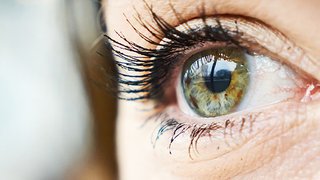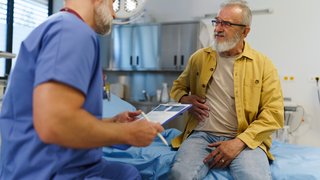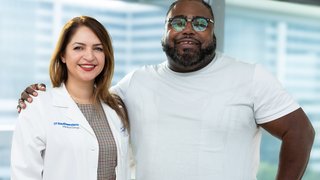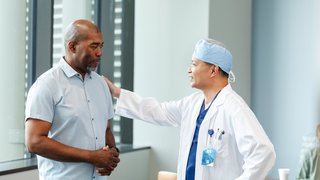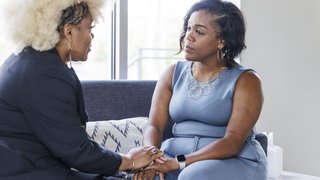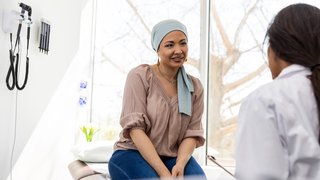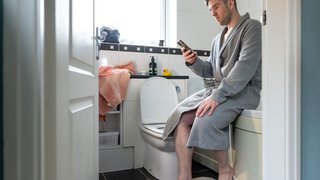Frisco RoughRiders exec stares down thyroid cancer with help of his UT Southwestern 'team'
March 10, 2019

Scott Burchett gently holds his daughter as she climbs on the playground at Dr Pepper Ballpark. At 18 months old, Lucy is a “firecracker” and very determined to keep up with her older brother and sister, 6-year-old twins Clara and Bennett.
Nearby, mom Caroline watches closely, eyes smiling, as the first wave of fans begins to trickle in for an idyllic Friday night of baseball in Frisco.
Scott and Caroline first crossed paths in elementary school in Garland. They were both in the choir (though classmate LeAnn Rimes got all the solos!). They fell in love in high school, and after college got married.
A six-month internship with the RoughRiders turned into 16 years, and Scott is now the club’s chief operating officer. They’ve built a home and a beautiful family here.
Seeing them together, this Burchett Bunch, you’d swear they just stepped off the cover of a parenting magazine.
You’d never guess that cancer nearly shredded their storybook.
Swinging at curveballs
At age 31, Scott was a marathon runner in the best shape of his life. His career was racing along, too. As an executive with the RoughRiders, the AA affiliate of the Texas Rangers, he helped establish the team as one of minor league baseball’s biggest success stories.
And after several rounds of fertility treatments, Caroline learned she was pregnant. They were finally starting the family they’d always dreamed about.
Life was good. Then it threw them a curveball.
“The two of us went on our own to the doctor (for the biopsy). We hadn’t said anything because we didn’t want to worry anyone. While Scott is recovering, the doctor pulls me aside and tells me, ‘We’re sure it’s cancer.’”
Caroline Burchett
During a routine physical, Scott’s doctor felt something in his neck. Probably nothing, he said, but he ordered a lymph node biopsy just to be safe.
Caroline remembers the day vividly: “The two of us went on our own to the doctor (for the biopsy). We hadn’t said anything because we didn’t want to worry anyone. While Scott is recovering, the doctor pulls me aside and tells me, ‘We’re sure it’s cancer.’”
Ears still ringing, she broke the news to her husband.

“That was definitely…” she says, emotions catching, “to be the person to deliver that news, that was really, really difficult.”
On May 25, 2012, the diagnosis was confirmed: Scott had stage II papillary carcinoma. Thyroid cancer.
On May 27, two days later, another curveball:
They found out Caroline was going to have twins.
“It was a real rollercoaster time,” Scott says. “I think the low point for me is when I had to tell people that I really cared about that your son, your brother, is sick. Seeing that look in their eyes, of them being scared, that was tough.”
Head spinning, he Googled “thyroid.” He wasn’t exactly sure what it was or what it did. The search also led him to the Dallas support group ThyCa, and he called looking for advice and some hope.
“(They) said my first call should be to UT Southwestern. They’re the best in the business here in Dallas,” he said. “They have doctors that specialize in this every day.”
‘In good hands’
Dr. Shelby Holt, an endocrine surgeon, is one of those doctors. Thyroid cancer patients travel from all over the region to be treated by her and the team at UT Southwestern.
“I knew I was in good hands after talking to Dr. Holt,” Scott said.

She walked him through his thyroid cancer journey:
- First, surgery to remove his thyroid and any suspicious lymph nodes
- Then, several weeks of recovery and a diet that starves the body of iodine
- Followed by a radioactive iodine treatment to kill remaining cancer cells
- Eventually, thyroid hormone replacement therapy, to get him feeling back to normal
Recovery was not going to happen overnight. And thyroid cancer has a tendency to come back, Scott said, so he understood he would have to be monitored, maybe for the rest of his life. But at his age, “the math” was in his favor.
“I was 31 years old and cancer was the furthest thing from my mind,” he said. “But I knew I had to get healthy so I could be the best father I could be.”
At the darkest time of his life, he leaned on lessons from his father and the sport they love.
“My team was my doctors at UT Southwestern. Having (them) to get me through this was super important.”
Scott Burchett
“Baseball is in my blood,” Scott said, recounting his childhood days not only playing and being coached by his father, Dave, but also sleeping in the TV truck as his dad produced Texas Rangers games.
“The lessons in sports can help you in life, especially when you’re dealing with cancer or a health issue,” said Scott, recently named top executive in the Texas League. “Hard work, perseverance, and relying on your teammates is what helped me through.
“My team was my family,” he added. “My team was my doctors at UT Southwestern. Having (them) to get me through this was super important.”
'My greatest fear was having to tell my children how amazing their father was'
Scott and Caroline Burchett met in grade school and fell in love in high school, but after finding out he had cancer and she was pregnant with twins in the same week, their world was turned upside down.
Thyroid-Palooza and the radioactive man
Cancer can be pretty isolating, but there are a few things that help.
Humor is one.
Two days before his 6 ½ hour surgery, Scott’s friends threw him a “thyroid-palooza” party. Gifts included a stuffed thyroid, because they knew he wouldn’t have one after the procedure. (Doctors also removed nearly 80 lymph nodes). His friends even started a Twitter account for Scott’s thyroid.
Education is another.
“I’m not a shoot-from-the hip kinda guy – whether it’s in my personal life or professional life,” he said. “My mom, who is a breast cancer survivor, bought me a 500-page book on the thyroid.” He read the entire thing on a cruise the two of them took together.

Writing proved cathartic for Caroline. The former kindergarten teacher’s blog posts detailing their cancer odyssey are beautiful, informative, and filled with raw emotion.
She detailed a rainy Tuesday in August when she had to take Scott to the nuclear medicine facility at UT Southwestern’s Harold C. Simmons Comprehensive Cancer Center to begin his radiation treatment:
“I walked out of the hospital in the rain and went out to my car to regroup, pray, and yes, cry a bit before driving home,” she wrote.
Inside, Scott went into a lead-lined room, opened a futuristic-looking box, and took a pill that contained a very large dose of radioactive iodine. About 20 minutes later, his father took him back to their house in Garland, where Scott was quarantined upstairs for 72 hours, because, essentially, he was radioactive.
“It is really surreal knowing your body is radioactive, and you can be a danger to others. It’s also kind of counter-intuitive to know they’re putting poison into your body to kill off the cancer cells,” Scott said. “It does play with your mind, and you become a little paranoid. But, once again, that goes back to the trust factor with the doctors, who know from years of experience and research the best treatment for your body.”
Scott and Caroline hadn’t spent more than a day or two apart in 22 years. But as a precaution, they couldn’t be in the same room together for nearly two weeks. Scott’s radiation levels were just too dangerous for her and the babies.
She would have to rely on regular phone calls, and her faith in Scott’s doctors.
“Scott means everything to me. Just the idea of him being taken away from me was devastating,” she said. “But I think my greatest fear was having to tell my children how amazing their father was instead of them experiencing it for themselves.
“When it really comes down to it, UT Southwestern saved my husband’s life,” she added. “We knew we were in the right place at the right time, in the hands of the perfect doctors for our situation. And we just felt at peace about it.”
A field of dreams in Frisco
Clara came into the world first, just seconds before her twin, Bennett. They’re 6 now, but she still relishes her role as Big Sister. Following their final day of kindergarten, she is leading Bennett and their baby sister around the grounds at Dr Pepper Ballpark.

Scott may be the COO of the RoughRiders, but Clara is definitely in charge.
As the Burchetts relax in the stands, getting ready for the first pitch, Scott puts 18-month-old Lucy on his lap and looks out across his field of dreams.
“This is the life that I always dreamed of when I was a little kid,” he said. “I knew I always wanted to marry my best friend, and I knew I wanted to work in sports, and I knew I wanted to have kids that I could run around the front yard and play catch with, and just have fun with. All of those dreams have come true.”
He doesn’t take any of it for granted.
“That one week that I was diagnosed and found out I had twins changed my life in so many profound ways,” he said. “I don’t take any of the little milestones for granted. Today is (Clara and Bennett’s) last day of kindergarten. They’re going to be big first-graders next year, which blows my mind.”
Most days, thyroid cancer seems like a distant memory, seven years in the rearview mirror. A small scar on the left side of his neck is the only visible trace.
But thyroid cancer is stubborn. A six-month scan showed a few active spots in Scott’s body, and a fine needle biopsy confirmed the presence of some residual cancer.
“That mapped out my path for treatment moving forward,” Scott said.
“That one week that I was diagnosed and found out I had twins changed my life in so many profound ways,” he said. “I don’t take any of the little milestones for granted.”
Scott Burchett

Dr. Ildiko Lingvay, an endocrinologist on the multidisciplinary team at UT Southwestern, recommended monitoring the cancer rather than putting Scott through more radiation.
“I had complete trust in her. And she was 100% right,” he said. “Most importantly, she continues to listen to me and make sure I get the right amount of medicine. There’s a tightrope to balance with thyroid cancer, and she does a great job of keeping me healthy but keeping my levels at a point where I can live life to the fullest.”
That means soaking up every minute with his kids and Caroline on nights like these. And continuing to make the Frisco RoughRiders the star of the Texas League.
It also means planning for a future and sharing his story.
“Seven years out, I’m able to sit here on the other side with the perspective of living life for seven years with this. It’s a unique platform,” he said. “I know there are other people struggling with the same things or worse. Being able to give them the same type of hope and confidence I had when people were able to do that for me, that’s very special.”
This fall, UT Southwestern will open a state-of-the-art specialty care clinic in Frisco, only a few miles north of the ballpark. As a cancer survivor and patient, Scott is excited about the possibility of going for scans at a facility in his own back yard.

Caroline loves the idea, too.
“Knowing that the level of care we’ve received in Dallas is going to be so close by for Scott, for my children, and myself if needed,” she said, “it’s just really reassuring.”
Scott also sees some parallels between the academic medical center that saved him and the booming city of Frisco.
“They’re both willing to push the envelope,” he said. “Frisco is always looking for ‘What’s next? How do we do something better? Don’t rest on your laurels.’ I think UT Southwestern does the same thing, so I think the combination is a natural fit.”


